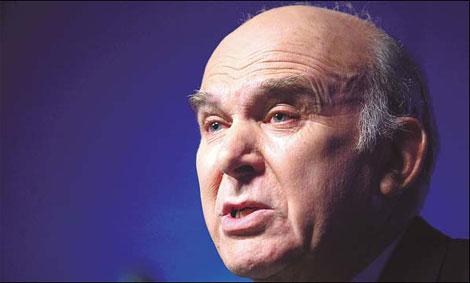
Vince Cable, UK Business Secretary, has welcomed China's currency moves. [Bloomberg]
FARNBOROUGH, UK - British Business Secretary Vince Cable on Monday reiterated that China is a "good trade partner", and he looks forward to visiting the nation soon.
Cable's endorsement comes days after a group of German industrialists, who accompanied Chancellor Angela Merkel during her recent China visit, had criticized Beijing's business and investment climate.
Jrgen Hambrecht, chairman of chemical company BASF, raised the concerns at a meeting with Premier Wen Jiabao. Hambrecht claimed many overseas companies are being forced to transfer business and technological know-how to Chinese companies in exchange for market access, according to a report in the Financial Times on Monday.
The World Bank in a July report gave China a low investment environment ranking.
Cable, however, has a different viewpoint. Responding to the question at the Farnborough International Airshow, he said, "No. I'm not criticizing China. It's a very good trade partner and a very good investment partner. We look forward to working with them."
He said that there is a significant number of Chinese companies who are keen on investing in Britain. "They are very welcome."
According to recent reports from the UK Trade & Investment Annual Review, China's investment in the UK has grown from 59 projects in 2008-09 to over 74 projects in 2009-10, up 25 percent.
The nation has also become the sixth biggest investor in projects in the UK during 2009-10.
Apart from this the Chinese projects have also contributed to more jobs in the UK with 76 percent growth from the previous year.
Cable also welcomed the recent flexible exchange rate policy adopted by Beijing and said it will help rebalance the world economy.
Terming China an economic success story, Cable said he remained hopeful of making an official visit to the country soon.
Cable's message also underpins the pragmatism that the new British government has on China, particularly at a time when the UK economy is struggling to recover from a recession.
British exports rose by just 42 million pounds (less than $64 million), or a measly 0.2 percent, to 21.48 billion pounds in May while imports rose by 693 million pounds, or 2.4 percent, to 29.54 billion pounds, the London Evening Standard reported.
"An export-led recovery looks like a pipe dream," the paper said, noting the figures pushed Britain's trade deficit with the rest of the world up from 7.41 billion pounds in April to 8.06 billion pounds in May, "the highest level since January when trade was hit by the freezing weather."
Though companies from the US and other European nations have raised concerns on the foreign investment environment in China, Britain has so far not made any comments.
"It's understandable because British investment in China is still quite small," said Li Xiaogang, director of the Foreign Investment Research Center at the Shanghai Academy of Social Sciences.
Responding to Hambrecht's complaint, Premier Wen said it was not right to say that China's investment environment is worsening.
Foreign direct investment (FDI) in China has grown by nearly 19.6 percent in the first half of the year over the same period last year, according to figures from the Ministry of Commerce. China attracted $12.51 billion of FDI in June, up 39.6 percent year on year.
"Foreign investment will not pour into a country where the investment environment is worsening," Wen said.
Ding Qingfen contributed to the story





